 Science and the Precautionary Principle in International Courts and Tribunals
Science and the Precautionary Principle in International Courts and Tribunals Published online by Cambridge University Press: 11 April 2011
The importance of co-operation between disputing parties
Co-operation between the disputing parties will often be key to the successful resolution of a scientific or technical dispute, and may also allow for a calibrated application of the precautionary principle that may not be as achievable through adjudicatory dispute settlement. Whether or not disputants ultimately do co-operate effectively cannot by any means be guaranteed, but judicial prompting may assist. The two awards in the well-known Trail Smelter Arbitration (US v. Canada) provide an early demonstration of how helpful it may be to allow time for co-operative study of how to address or ameliorate a problem, here the distribution of sulphur dioxide from the Canadian smelter at Trail through cross-border currents in the upper air. In its first award the Tribunal decided that three consultants would be appointed for the gathering of meteorological observations, and prescribed a temporary emissions limitations regime. In its second award the Tribunal was then in a position to lay down a detailed and permanent regime.
Adjudicatory proceedings may be just one of the stages through which a dispute proceeds, and it is part of the function of an international court or tribunal to take this into account in deciding how to deal with a case. The practical significance of scientific and administrative co-operation is apparent upon considering the various high-profile international disputes involving scientific uncertainties introduced in the pages that follow.
To save this book to your Kindle, first ensure [email protected] is added to your Approved Personal Document E-mail List under your Personal Document Settings on the Manage Your Content and Devices page of your Amazon account. Then enter the ‘name’ part of your Kindle email address below. Find out more about saving to your Kindle.
Note you can select to save to either the @free.kindle.com or @kindle.com variations. ‘@free.kindle.com’ emails are free but can only be saved to your device when it is connected to wi-fi. ‘@kindle.com’ emails can be delivered even when you are not connected to wi-fi, but note that service fees apply.
Find out more about the Kindle Personal Document Service.
To save content items to your account, please confirm that you agree to abide by our usage policies. If this is the first time you use this feature, you will be asked to authorise Cambridge Core to connect with your account. Find out more about saving content to Dropbox.
To save content items to your account, please confirm that you agree to abide by our usage policies. If this is the first time you use this feature, you will be asked to authorise Cambridge Core to connect with your account. Find out more about saving content to Google Drive.